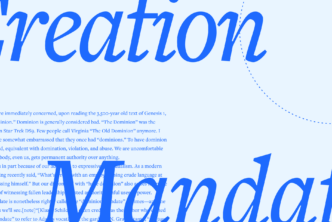How strange would it sound if a friend described what they did this morning like this? “After she got out of bed, she took a shower and then made a quick breakfast for herself—just some coffee and a bagel. I was in such a hurry that I didn’t even finish my bagel and just took the coffee with me!”
Be honest. You would probably wonder if your friend needed medication. Although your friend was describing what she did this morning, the first few details sounded like she was talking about someone else. If the information was about her and spoken by her, why not use “I” and “my”—what we call “first person” pronouns in grammar? Why would she refer to herself in the third person? We just don’t talk or write like that.
Neither would the biblical writers—but that is exactly what we read in many biblical passages.
Consider the first four verses of the book of Ezekiel:
In the thirtieth year, in the fourth month, on the fifth day of the month, as I was among the exiles by the Chebar canal, the heavens were opened, and I saw visions of God. On the fifth day of the month (it was the fifth year of the exile of King Jehoiachin), the word of the Lord came to Ezekiel the priest, the son of Buzi, in the land of the Chaldeans by the Chebar canal, and the hand of the Lord was upon him there. As I looked, behold, a stormy wind came out of the north, and a great cloud, with brightness around it, and fire flashing forth continually, and in the midst of the fire, as it were gleaming metal.
The first two verses use the first person (“I”), which leads us to believe that Ezekiel himself is writing. But then there is a switch to the third person in verse three, as though the writer was not the famous prophet (“to Ezekiel”; “him”). Then it’s back to the first person (“I”) again in verse four. What’s going on? Can’t Ezekiel decide if he’s writing or not?
There’s no multiple personality disorder here. The switch between grammatical persons is simply the tell-tale sign of an editor. Someone other than Ezekiel inserted verse three to make it clear that the prophet wasn’t crazy: The prophet saw God and was led by the Spirit to describe what follows in the book.
Who had the authority to edit the Bible like this? The short answer is whomever God moved to do so under inspiration. The longer answer is that, in the case of the prophetic writings, someone accepted by the believing community of Israel to be a member of the prophetic class or tradition served as editor of the preaching and teaching of the prophets.
A picture of a prophetic class emerges during the time of Elijah and Elisha. The prophets lived together in an organized community. The group was known as “the sons of the prophets” (2 Kgs 2:3, 5, 7, 15) and included married couples (2 Kgs 4:1). Such communities began at least as early as the time of Samuel (1 Sam 10).
The prophetic community in Elijah and Elisha’s era was large. During the time of Elijah, there were at least 100 prophets hidden by Obadiah from Ahab and Jezebel (1 Kgs 18:4). And during Elisha’s period, 50 “sons of the prophets,” which isn’t even the whole group, are mentioned (2 Kgs 2:7).
The “sons of the prophets” served God under the leadership of a main prophet, who did most of the public speaking. We have several specific examples of this: Baruch (Jer 36), Gehazi (2 Kgs 5:20), and Elisha (2 Kgs 2:5). Any of the unnamed prophets within the community could have been tasked with gathering the written words of their teacher, the main prophet, and putting them into a scroll or book. Writing down, organizing, and editing the prophet’s words could have taken place entirely after the death of a leading prophet, under the guidance of the Spirit. This process is similar to the way the Gospels were produced. We don’t know for sure how it worked, but we do know that more than one hand was responsible for what we have today. That these people served God in this way, without recognition, is a lesson to us all.

This article is excerpted from Dr. Heiser’s book I Dare You Not to Bore Me with the Bible.
Discover more fascinating facets of the Bible with Dr. Heiser
Keep exploring the strange, perplexing, and mysterious aspects of the Bible with these excerpts from Dr. Michael S. Heiser’s The Unseen Realm: Recovering the Supernatural Worldview of the Bible. Or dive deeper into the supernatural world of the Bible and pick up a copy of The Unseen Realm today.





